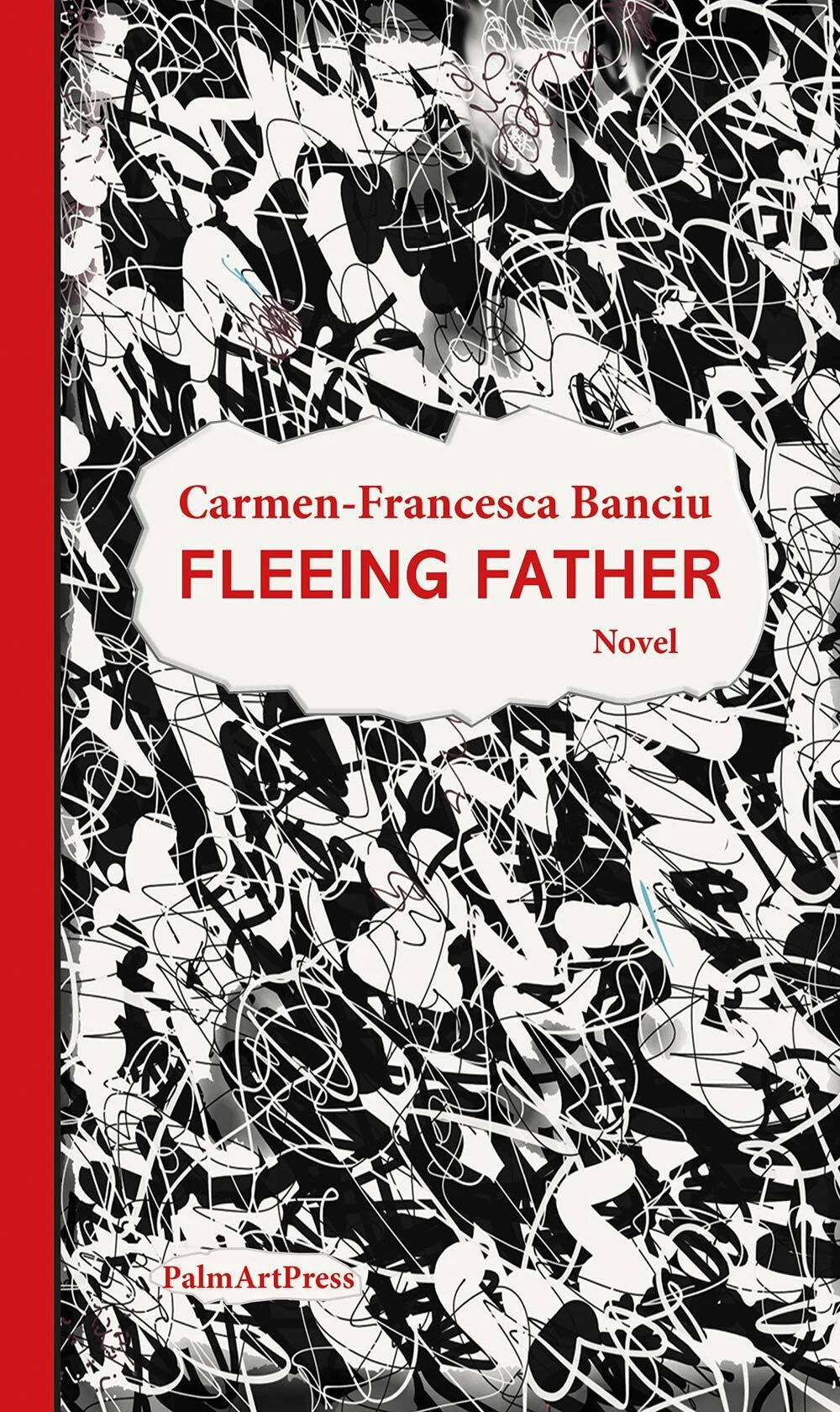Fleeing Father
Fleeing Father
By Carmen-Francesca Banciu, PalmArtPress, $20.00
Fleeing Father is a bilingual novel, in English and German, by Romanian-born author Carmen-Francesca Banciu. Narrated by a Romanian girl who comes of age as her country marches toward revolution, this bildungsroman is the first in a trilogy newly translated from German into English by Elena Mancini and Catharine J. Nicely.
In a syntax all her own, Banciu transports the reader to Romania in the late twentieth century to a town on the cusp of political and social transformation. We witness her reckon with the tension of her home life under the rule of her high-ranking communist parents during a time of mounting political and social unrest. She reveals the dark side of her parents’ utopia, the collateral damage unseen or ignored by their political tunnel vision. Readers of Eimear McBride’s A Girl is a Half-formed Thing or Lucy Ellmann’s Ducks, Newburyport will recognize in this text an urgency that demands attentive, empathetic reading.
With first-person storytelling reminiscent of memoir, the book has a grammar of its own that pulses with the urgency of someone slowly disclosing information, revealing memory by memory. Banciu’s use of conversational repetition echoes the refrains of political rhetoric and reminds us the narrator is a child of propogandists. The fractured prose lends itself to reading the book in fragments which, for some readers, may help to process the historic context alongside the traumatic subject matter. There is a tonal abruptness that builds to enhance and emphasize the narrator’s voice: that of a cautious child who grows up still hesitant to share information, still calculating how adults may respond to every single word. Chapter by chapter, she is haunted by the quiet everyday devastations of her youth.
It would be easy to say the protagonist was denied a childhood, but it feels important to recognize that she is part of a generational cohort of children raised by this wave of communism in Romania. The normalized brutality of her childhood is apparent as she assumes the role of parenting herself.
“I rebelled in my own way. And brought the strap. Gave it to her without hesitating. Mother tightened the strap. Struck with an ever-increasing fury. You are not even crying. No. I didn’t cry. I knew that crying was a sign of weakness.”
A few pages later, she emphasizes how she felt compelled to take on the duty of following through with her parents own prescribed discipline. “I would go to get the strap. Order had to prevail. As well as discipline. One had to rely on a comrade in every situation.”
From the title, we understand that the protagonist’s father will make an exit in some way. But we learn early on that he was rarely present to begin with. “My parents worked a lot, were seldom at home. Father least of all.” However, even in his absence, her father’s influence dictates the rigid parameters of her world. The tension between her mother’s affluent upbringing and her father’s ideologies — or, more aptly, the Romanian Communist Party’s ideologies — is present in their parenting. The party is prioritized over the child.
“I always enjoyed ballet lessons. But suddenly I was no longer allowed to go. I would have gladly danced my whole life. Expressed my joy through dance. Express oneself. Dance. Lose oneself and forget. And find oneself again. But that was not the point of it. Mother was accused of acting unpolitically. Father was furious. Horrified. Mother admitted to having made a political mistake.”
She is removed from ballet class, her father “horrified” by the political implications. Yet, her parents don’t seem horrified by clear indications that the piano instructor is abusing their child. In a matter-of-fact reflection, we learn the same pianist taught the narrator’s mother as a child.
“I don’t believe this was mother’s revenge. It was her own arbitrary way of conveying an image of life to me early on. I should learn to stand above things. In a sense I succeeded. For I still today like playing the piano.”
While she plays the role of the ideal precocious child in her home and community, she quietly develops her own moral compass and sense of rebellion. We see this take shape as she begins to write—in secret—at a young age. Through writing, her own burgeoning freedom is expressed. However, over the years, even her writing bears the burden of the party’s watchful political eye; the child who hides her writing grows into the woman whose notebooks are confiscated by the secret police. As she seeks her own liberation and the pursuit of creative expression, her country draws closer to the end of its decades-long communist rule.
I found myself researching Romanian history, trying to piece together a timeline of events between communist leader Gheorghe Gheorghiu-Dej’s death in 1965 and dictator Nicolae Ceaușescu’s execution in 1989. In the novel, the fluidity of memory is favored over linear time and episodic scenes, wavering between temporal realities and emotional recall. Narration shifts from childlike observations to the memories of an adult — but the tone remains the same. This subtle craft conveys how trauma can impact memory.
Readers unfamiliar with Romania’s recent political history may feel compelled to search for more historical context, and will likely discover that the protagonist’s circumstances mirror the author’s: both are born in Romania and raised by parents involved in the rising communist party, both leave their isolated hometowns for larger cities where they are able to live, write and express themselves without looming threats like the secret police. Yet, the novel’s opening and closing scenes—in which our narrator returns home to visit her father—demand the question: can we ever truly leave our roots behind? In these scenes, we witness a daughter standing sturdy among the rubble of her fatherland’s vision for a future that was never meant for her. As the novel ends, it sets the scene for the next two with a glimpse of healing, hope, and a subtle sense of humor that shine a light on the name of the series: Trilogy of the Optimists.
Kait Walser
Kait is a poet and copywriter living in New York City. She currently hosts and curates At the Inkwell’s NYC reading series. She was the founding host and curator of Union Square Slam, where she also co-facilitated workshops. Kait holds an MFA from Wilkes University, where she earned the Wilkes-Etruscan Press prize. She served as an inaugural Artist-in-Residence at the Delaware Highlands Conservancy’s Lemons Brook Farm. You can find her writing online and in print.


